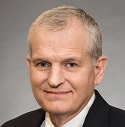
Angelle Sander, PhD, FACRM
ANGELLE SANDER IN THE SPOTLIGHT
Dr. Angelle Sander is a clinical neuropsychologist who is an Associate Professor in the Department of Physical Medicine and Rehabilitation at Baylor College of Medicine, where she has been working since 1998. She is Director of the Division of Clinical Neuropsychology and Rehabilitation Psychology. She also serves as Director of the Brain Injury Research Center at TIRR Memorial Hermann.
Dr. Sander began her research career as a Post-Doctoral Fellow, under the supervision of Dr. Jeffrey Kreutzer at Virginia Commonwealth University/Medical College of Virginia, funded by an Advanced Rehabilitation Research and Training Center grant from the National Institute on Disability, Independent Living, and Rehabilitation Research (NIDILRR). She was then awarded a Mary E. Switzer Fellowship to study caregivers of persons with traumatic brain injury (TBI). This launched Dr. Sander on a 20-year research career in outcomes following TBI. She has served as Principal Investigator or Co-Investigator on 17 federally funded grants, including 2 NIDILRR-funded Rehabilitation Research and Training Centers on Community Integration/Participation after TBI and 4 TBI Model System awards. She is nationally and internationally respected for her work on predicting and improving outcomes for persons with TBI. Her areas of expertise within TBI include impact on family caregivers, cultural disparities in outcomes, intimacy and sexuality, and treatment of cognitive, emotional, and psychosocial problems.
Dr. Sander has been active in ACRM and the BI-ISIG since 1999. She was a member of the Cognitive Rehabilitation Task Force from 2004-2015, and participated in translating Cicerone and colleagues’ systematic reviews on cognitive rehabilitation for consumers. She is a past member of the Clinical Practice Committee, Consumer Relations Committee (Chair from 2010-2012), and the Communications Committee. She is currently a member of the BI-ISIG Chronic Brain Injury Task Force and co-chairs the Military Caregiver Task Force within the Military and Veterans Networking Group. Dr. Sander said, “Many of the most successful and rewarding collaborations that I have had during my career began informally in small BI-ISIG groups that were passionate about doing research that would improve clinical care and make a difference in the lives of persons with TBI and their caregivers.”
Dr. Sander has co-authored over 90 peer-reviewed publications, 15 book chapters, and numerous educational materials for persons with TBI, their caregivers, and rehabilitation professionals. Dr. Sander’s contributions to the field of rehabilitation have been recognized by awarding of several honors, including the Deborah L. Wilkerson Early Career Award from ACRM, the BI-ISIG’s David Strauss Poster Award, the Mitchell Rosenthal Memorial Lecture at the 42nd Annual Williamsburg Brain Injury Conference, and the 2018 William Fields Caveness Award from the Brain Injury Association of America. She has also been the recipient of several Baylor College of Medicine Physical Medicine and Rehabilitation Awards for her research, residency education, and clinical service.
Dr. Sander hopes that her most enduring legacy will be in addressing topics that have practical importance to persons with TBI and their caregivers and that result in improvements in their everyday functioning and quality of life. Much of her research focuses on relationships after TBI, as she recognizes the importance of relationships to quality of life. Relationships with her fellow rehabilitation researchers have been a highlight of her career, and she values ACRM for fostering these relationships.

Mark Sherer, PhD, ABPP, FACRM
MARK SHERER IN THE SPOTLIGHT
Dr. Mark Sherer is Senior Scientist and Vice President for Research at TIRR Memorial Hermann. He is Clinical Professor of Physical Medicine and Rehabilitation at Baylor College of Medicine and the University of Texas Medical School at Houston. He is a board certified neuropsychologist with over 30 years’ experience as an administrator, clinician, educator, and investigator. In his current position, he provides overall guidance to research programs at TIRR Memorial Hermann.
Dr. Sherer has served on numerous editorial boards of peer-reviewed publications, such as the Journal of Head Trauma Rehabilitation, The Clinical Neuropsychologist, Rehabilitation Psychology, Applied Neuropsychology and the Archives of Physical Medicine and Rehabilitation. He has published over 145 peer-reviewed articles and numerous book chapters related to brain injury rehabilitation and is known locally, nationally and internationally as an expert and pioneer in brain injury rehabilitation.
Dr. Sherer is a fellow of the American Psychological Association, the National Academy of Neuropsychology, and the American Congress of Rehabilitation Medicine and his contributions to brain injury rehabilitation research and clinical practice have been recognized with the Mitchell Rosenthal Award, the Leonard Dillard Award, the Williams Fields Caveness Award, and the Howard E. Yuker Award. He was recently awarded the Robert L. Moody Prize at the 2018 Galveston Brain Injury Conference, which recognizes the significant contributions in brain injury research and rehabilitation.
As an esteemed member in brain injury research, Dr. Sherer has also served on a number of review panel and advisory boards, including the NIDRR Model Systems Knowledge Translation Center Research Advisory Board and the Michael E Debakey VA Medical Center- Center of Excellence in TBI. Dr. Sherer has been Principal Investigator and Project Director for 5 consecutive TBI Model Systems grants. He and Dr. Angelle Sander published an edited text entitled, “Handbook on the Neuropsychology of Traumatic Brain Injury.” Dr. Sherer has developed scales that are commonly used in clinical work and research such as the Awareness Questionnaire and the Confusion Assessment Protocol.
When asked about career accomplishments of which he is most proud, he notes that he developed the first community integration program for persons with brain injury in Alabama in 1984. This was an early time in the development of these programs and with his work, the team extended models used at other programs by creating custom job trials for each return to work client. They integrated the job site as much as possible. When he started at TIRR in 1991, he brought these approaches to TIRR where the therapy team was able to take advantage of the impact of context on memory given the benefit of being at the work site. These methods helped push the barriers for brain injury rehabilitation and community reintegration.

Raj Kumar, PhD
RAJ KUMAR IN THE SPOTLIGHT
Dr. Raj Kumar is a post-doctoral fellow in the Department of Rehabilitation and Human Performance at the Icahn School of Medicine at Mount Sinai. Before his post-doc, Dr. Kumar received his PhD in Epidemiology from the University of Pittsburgh Graduate School of Public Health, and MPH in Chronic Disease Epidemiology at the Yale School of Public Health. Early in his career, Dr. Kumar has already built a strong reputation for blending the fields of Epidemiology and Rehabilitation.
His dissertation work, under the mentorship of Dr. Amy Wagner, examined the effects of acute inflammation and infection on long-term outcomes after Traumatic Brain Injury (TBI). During his doctoral training, Dr. Kumar published over 20 publications examining the effects of brain- and blood-based biomarkers and its associations with measures of disability and mood deficits after TBI. At the culmination of his training, he was awarded the prestigious Nancy Caroline Award, which is given to the most outstanding trainee at the Safar Center for Resuscitation Research at the University of Pittsburgh.
Also as a part of Dr. Kumar’s dissertation work, he worked with colleagues at the University of Pittsburgh to develop a probabilistic merged database of the National Trauma Databank and TBI Model Systems National Database. As a result of the momentum generated from the merger of these two databases, the American College of Surgeons (ACS) and American Congress of Rehabilitation Medicine (ACRM) are in active discussions to blend clinical and research efforts between trauma and rehabilitation for TBI.
Dr. Kumar has led and co-authored multiple publications using the TBI Model Systems National Database. His manuscript using the treelet transform methodology to characterize the epidemiology of comorbidities with TBI was selected by the Brain Injury Association of America for the noteworthy Mitchell Rosenthal webinar, an hour-long lecture targeting rehabilitation clinicians across the country that care for patients with TBI.
In his post-doctoral fellowship, Dr. Kumar will continue a line of research in TBI at the Brain Injury Research Center at Mount Sinai under the mentorship of ACRM BI-ISIG Chair, Dr. Kristen Dams-O’Connor. His research will broadly focus on the long-term cognitive, physical, and mental health consequences for individuals with a history of TBI. Dr. Kumar’s long-term goal is to become an independent investigator, conducting his own line of epidemiological TBI research. His professional home is ACRM, and he hopes to serve an active role in the rehabilitation community for years to come.










